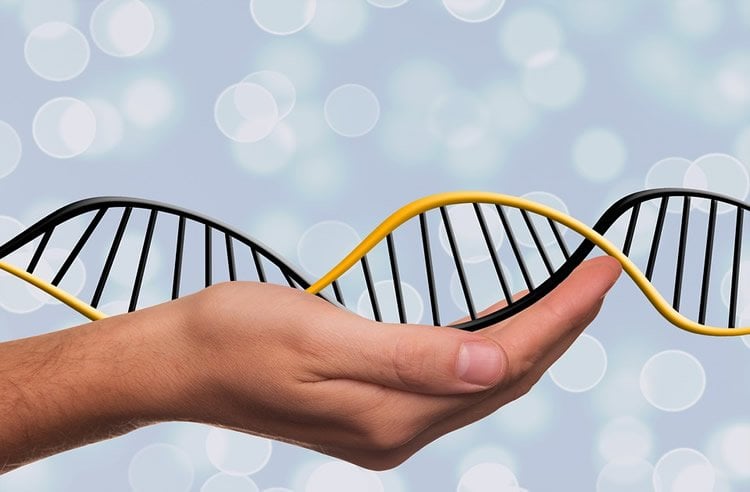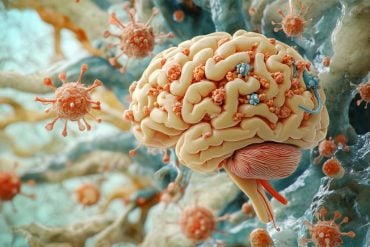Summary: Teaming up with 23andMe, UCSD researchers have discovered a genetic signature for the tendency to undervalue future rewards which overlaps with ADHD and obesity.
Source: UCSD.
Researchers at University of California San Diego School of Medicine have found a genetic signature for delay discounting — the tendency to undervalue future rewards — that overlaps with attention-deficit/hyperactivity disorder (ADHD), smoking and weight.
In a study published December 11 in Nature Neuroscience, the team used data of 23andme customers who consented to participate in research and answered survey questions to assess delay discounting. In all, the study included the data of more than 23,000 people to show that approximately 12 percent of a person’s variation in delay discounting can be attributed to genetics — not a single gene, but numerous genetic variants that also influence several other psychiatric and behavioral traits.
“Studying the genetic basis of delay discounting is something I’ve wanted to do for the entirety of my 20 years of research, but it takes a huge number of people for a genetics study to be meaningful,” said senior author Abraham Palmer, PhD, professor of psychiatry and vice chair for basic research at UC San Diego School of Medicine. “By collaborating with a company that already has the genotypes for millions of people, all we needed was for them to answer a few questions. It would have been difficult to enroll and genotype this many research participants on our own in academia — it would’ve taken years and been cost prohibitive. This is a new model for science.”
According to Palmer, every complicated nervous system needs a way of assessing the value of current versus delayed rewards. Most people think of the “marshmallow experiment,” he said, referring to the classic experiment where children were tested for their ability to delay gratification by giving them the choice between one marshmallow now or two marshmallows a few minutes later.
“A person’s ability to delay gratification is not just a curiosity, it’s integrally important to physical and mental health,” Palmer said. “In addition, a person’s economic success is tied to delay discounting. Take seeking higher education and saving for retirement as examples — these future rewards are valuable in today’s economy, but we’re finding that not everyone has the same inclination to achieve them.”
For the study, the team looked at data from 23andMe research participants who answered survey questions that could be used to assess delay discounting. For example, customers were asked to choose between two options: “Would you rather have $55 today or $75 in 61 Days?”
“In less than four months, we had responses from more than 23,000 research participants,” said Pierre Fontanillas, PhD, a senior statistical geneticist at 23andMe. “This shows the power of our research model to quickly gather large amounts of phenotypic and genotypic data for scientific discovery.”
By comparing participants’ survey responses to their corresponding genotypes and complementary data from other studies, Palmer’s team found a number of genetic correlations.
“We discovered, for the first time, a genetic correlation between ADHD and delay discounting,” said first author Sandra Sanchez-Roige, PhD, a postdoctoral researcher in Palmer’s lab. “People with ADHD place less value in delayed rewards. That doesn’t mean that everyone with ADHD will undervalue future rewards or vice versa, just that the two factors have a common underlying genetic cause.”
The researchers also found that delay discounting is genetically correlated with smoking initiation. In other words, people who undervalue future rewards may be more likely to start smoking and less likely to quit if they did.
Body weight, as determined by body mass index (BMI), was also strongly correlated with delay discounting, suggesting that people who don’t place a high value on future rewards tend to have a higher BMI.
The team determined that delay discounting negatively correlated with three cognitive measures: college attainment, years of education and childhood IQ. In other words, the genetic factors that predict delay discounting also predict these outcomes.
In many studies that rely on surveys, particularly for those in which the participants are paid to fill out the survey, there’s always a chance that some answered randomly or carelessly. Palmer’s survey included three questions to assess how carefully the research participants were answering the questions. For example, one asked “Would you rather have $60 today or $20 today?” There’s only one correct answer and the team saw only 2.1 percent of participants get even one of those three questions wrong, assuring them that the vast majority were answering the questions carefully.

“We are very thankful to the 23andMe research participants who took the time to complete our survey — they weren’t paid to do it, they are citizen-scientists volunteering their help,” Palmer said. “It’s quite a feeling to think that so many people were willing to help out in this interest of ours.”
Palmer hopes to expand the study to a larger and more diverse population to strengthen their findings.
“An even larger study would help start identifying specific genes with a higher level of confidence,” he said. “Then we can do hypothesis-driven studies of this trait with animal or cellular models.”
While most research studies begin in test tubes, cells grown in the laboratory and animal models before moving to humans, the opposite is true here. After starting with these human observations, Palmer’s team is now studying the same delay discounting-related genetic traits in rodent models. They want to determine if changing those genes experimentally changes rodent behavior as expected. If it does, they will be able to use the animals to study how those delay discounting-related genes lead to those behaviors, at a molecular level.
Study co-authors also include: Sarah L. Elson and Research Team, 23andMe, Inc.; Anita Pandit, Ellen M. Schmidt, Gonçalo R. Abecasis, University of Michigan; Johanna R. Foerster, Norwegian University of Science and Technology; Joshua C. Gray, Uniformed Services University of the Health Sciences; Harriet de Wit, University of Chicago; Lea K. Davis, Vanderbilt University; and James MacKillop, McMaster University/St. Joseph’s Healthcare Hamilton and Homewood Research Institute.
Funding: This work was supported by Peter Boris Chair in Addictions Research at McMaster University, St. Joseph’s Healthcare Hamilton, Frontiers of Innovation Scholars Program and Interdisciplinary Research Fellowship in NeuroAIDS.
Source: Heather Buschman – UCSD
Publisher: Organized by NeuroscienceNews.com.
Image Source: NeuroscienceNews.com image is in the public domain.
Original Research: Abstract for “Genome-wide association study of delay discounting in 23,217 adult research participants of European ancestry” by Sandra Sanchez-Roige, Pierre Fontanillas, Sarah L. Elson, Anita Pandit, Ellen M. Schmidt, Johanna R. Foerster, Gonçalo R. Abecasis, Joshua C. Gray, Harriet de Wit, Lea K. Davis, James MacKillop & Abraham A. Palmer in Nature Neuroscience. Published online December 11 2017 doi:10.1038/s41593-017-0032-x
[cbtabs][cbtab title=”MLA”]UCSD “Study Links Tendency to Undervalue Future Rewards With ADHD and Obesity.” NeuroscienceNews. NeuroscienceNews, 11 December 2017.
<https://neurosciencenews.com/adhd-obesity-reward-genetics-8160/>.[/cbtab][cbtab title=”APA”]UCSD (2017, December 11). Study Links Tendency to Undervalue Future Rewards With ADHD and Obesity. NeuroscienceNews. Retrieved December 11, 2017 from https://neurosciencenews.com/adhd-obesity-reward-genetics-8160/[/cbtab][cbtab title=”Chicago”]UCSD “Study Links Tendency to Undervalue Future Rewards With ADHD and Obesity.” https://neurosciencenews.com/adhd-obesity-reward-genetics-8160/ (accessed December 11, 2017).[/cbtab][/cbtabs]
Abstract
Genome-wide association study of delay discounting in 23,217 adult research participants of European ancestry
Delay discounting (DD), the tendency to discount the value of delayed versus current rewards, is elevated in a constellation of diseases and behavioral conditions. We performed a genome-wide association study of DD using 23,127 research participants of European ancestry. The most significantly associated single-nucleotide polymorphism was rs6528024 (P = 2.40 × 10−8), which is located in an intron of the gene GPM6B. We also showed that 12% of the variance in DD was accounted for by genotype and that the genetic signature of DD overlapped with attention-deficit/hyperactivity disorder, schizophrenia, major depression, smoking, personality, cognition and body weight.
“Genome-wide association study of delay discounting in 23,217 adult research participants of European ancestry” by Sandra Sanchez-Roige, Pierre Fontanillas, Sarah L. Elson, Anita Pandit, Ellen M. Schmidt, Johanna R. Foerster, Gonçalo R. Abecasis, Joshua C. Gray, Harriet de Wit, Lea K. Davis, James MacKillop & Abraham A. Palmer in Nature Neuroscience. Published online December 11 2017 doi:10.1038/s41593-017-0032-x







